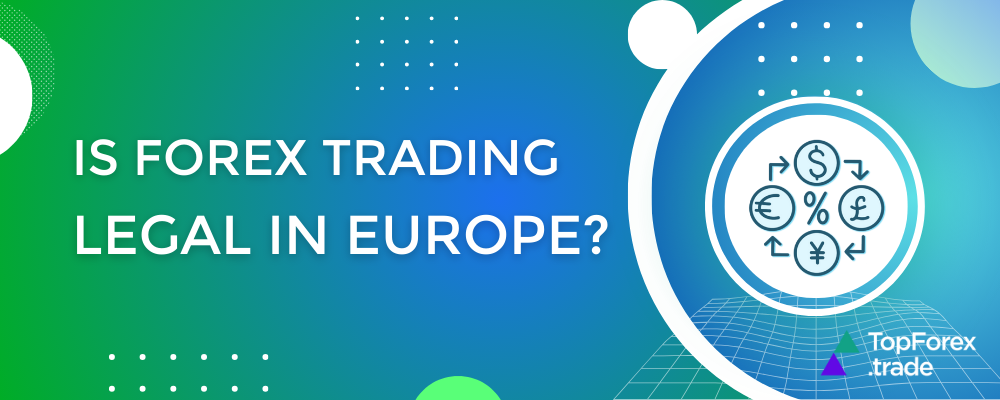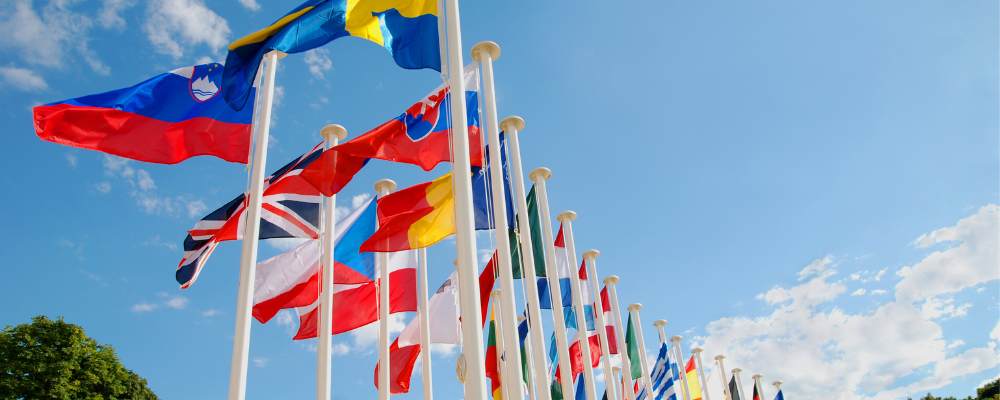Is Forex trading legal in Europe? Understanding regulators and FX brokers

Europe is a diverse continent with a rich history, cultural heritage, and a complex political landscape. It is home to a range of countries, each with its own unique economic and regulatory environments. Europe is also one of the world’s major financial hubs, hosting significant financial centers such as London, Frankfurt, and Zurich. The European Union (EU), a political and economic union of 27 member states, plays a crucial role in shaping the financial regulations across the continent.
In this article, we will discuss Forex trading regulation in Europe. Forex trading, or foreign exchange trading, involves buying and selling currencies on the global market. The regulatory environment for Forex trading in Europe is robust and aims to protect traders and ensure market integrity. We will explore the legal status of Forex trading in various European countries and the specific regulations that govern this activity.
Is Forex trading legal in Europe?

Yes, Forex and other financial instruments trading are legal in Europe, and the continent has a well-established regulatory framework to oversee these activities. Each country within Europe has its own regulatory body responsible for monitoring and enforcing financial market regulations, while the European Union (EU) harmonizes these rules across its member states.
In the European Union, Forex trading is regulated under the Markets in Financial Instruments Directive (MiFID II). This directive provides a unified regulatory environment for investment services across the member states, ensuring a high level of investor protection and market efficiency. MiFID II requires Forex brokers to adhere to stringent guidelines, including the provision of clear information to clients, maintaining adequate capital reserves, and implementing measures to prevent market abuse.
Moreover, within the European Union, there is a system known as “passporting,” which allows financial services firms, including Forex brokers, to operate across all EU member states if they are licensed in one member state. This system simplifies cross-border operations, as a broker licensed in one EU country can provide services throughout the entire EU without needing additional licenses. For example, a broker licensed in Germany by the Bundesanstalt für Finanzdienstleistungsaufsicht (BaFin) can legally offer its services in France, Italy, Spain, and other EU countries after notifying the respective local regulatory authorities.
Here’s a brief overview of the regulatory landscape in some key European countries:
FX trading in Germany
The Bundesanstalt für Finanzdienstleistungsaufsicht (BaFin) is the regulatory authority overseeing financial markets, including Forex trading. BaFin ensures brokers comply with MiFID II standards, providing robust investor protection.
eToro is a highly reputable broker in Germany, renowned for its exceptional features designed with traders in mind. When it comes to market conditions, eToro offers some of the most attractive options. They have low Forex fees, a minimal deposit requirement to open a standard account, and low trading and non-trading fees. Whether you are an experienced trader or new to the field, eToro is definitely worth exploring. You’ll be impressed by their CopyTrader feature and the diverse range of trading platforms suitable for various situations.
FX trading in the UK
The Financial Conduct Authority (FCA) is the main regulatory body overseeing Forex trading. Despite Brexit, the UK continues to maintain high regulatory standards, similar to those under MiFID II.
Plus500, a top UK brokerage firm, offers a wide range of financial instruments, including CFDs on ETFs, currencies, commodities, stocks, and indices. With advanced features and tools, accessible via Web Trader and mobile apps, Plus500 provides a comprehensive trading experience. Regulated by the FCA, Plus500 adheres to strict financial standards, aiming to provide most services free of charge.
82% of retail investor accounts lose money when trading CFDs with this provider. You should consider whether you can afford to take the high risk of losing your money.
FX trading in Italy
The Commissione Nazionale per le Società e la Borsa (CONSOB) is responsible for regulating the Italian financial markets. CONSOB ensures that brokers operate transparently and adhere to strict regulatory standards to protect investors.
OANDA is a top choice for traders in Italy, offering a wide range of markets including Forex, commodities, cryptocurrencies, and securities. Traders can open demo and standard accounts, with advanced trader status available under certain conditions. OANDA does not charge fees for deposits or withdrawals, although payment systems may apply their own fees, and supports unlimited deposit and withdrawal amounts. The broker provides a customizable online platform, MT4 (MetaTrader 4), and mobile apps for convenient access. OANDA is regulated by authorities such as RFED (USA), MAS (Singapore), IIROC (Canada), FCA (Europe), FSA (Japan), and ASIC (Australia), ensuring strict regulatory standards and security.
FX trading in Netherlands
The Netherlands Authority for the Financial Markets (AFM) supervises financial markets, including Forex trading. The AFM enforces MiFID II regulations, ensuring market integrity and investor protection.
NAGA Markets is a reputable broker in the Netherlands, offering a wide range of asset classes, including stocks, Forex, ETFs, futures, commodities, and metals.
Traders can use multiple platforms, such as MetaTrader 4 and 5, and the user-friendly NAGA Webtrader. Mobile versions are also available, allowing convenient market access anytime, anywhere.
FX trading in Norway
Although not an EU member, Norway is part of the European Economic Area (EEA) and aligns with MiFID II regulations. The Financial Supervisory Authority of Norway (FSA) regulates Forex trading, ensuring compliance with EU standards.
XTB is a highly popular brokerage firm in Norway, recognized globally in over 13 countries. As one of the largest brokers worldwide, XTB offers comprehensive trading services for forex pairs and contracts for difference (CFDs).
Regulated by reputable financial authorities such as the Financial Conduct Authority (FCA) in the UK, the Polish Financial Supervision Authority (KNF), and the Cyprus Securities and Exchange Commission (CySEC), XTB ensures strict adherence to regulations, providing clients with a secure and trustworthy trading environment, emphasizing fund safety.
FX trading in France
The Autorité des Marchés Financiers (AMF) regulates Forex trading in France, ensuring brokers comply with MiFID II and offering strong investor protection measures.
HF Markets, a highly renowned broker in France, specializes in trading various assets, including currency pairs, precious metals, indices, stocks, cryptocurrencies, and CFDs. Notable for its multiple account types and social trading functionality, HF Markets offers commission-free trading and a low initial deposit requirement, making it accessible to traders of all levels. Regulated by reputable authorities such as CySEC, FCA, FSCA, DIFC, and FSA, HF Markets ensures a safe and secure trading environment for its clients.
FX trading in Sweden
The Finansinspektionen (FI) is the regulatory authority in Sweden overseeing Forex trading. It enforces MiFID II standards to maintain market integrity and protect investors.
XM Group, a highly regarded broker in Sweden, specializes in online Forex trading, offering access to various financial instruments like currency pairs, CFDs, commodities, indices, metals, energies, and cryptocurrencies. Clients can choose from different account types with benefits such as negative balance protection and tight spreads. Trading is facilitated through the MetaTrader 4 and MetaTrader 5 platforms, available on web and mobile devices, with a user-friendly mobile app for seamless market access.
FX trading in Denmark
The Danish Financial Supervisory Authority (DFSA) regulates Forex trading in Denmark, ensuring compliance with MiFID II and safeguarding investor interests.
AvaTrade, a leading broker in Denmark, is known for its exceptional brokerage services and wide range of trading instruments. The company prioritizes transparency, complying with European and international regulations. With licenses from reputable regulatory bodies like ASIC, FSA, Abu Dhabi, and the British Virgin Islands, AvaTrade ensures a secure and regulated trading environment for clients.
FX trading in Cyprus, Poland, Estonia, and Bulgaria
The Cyprus Securities and Exchange Commission (CySEC) is known for its stringent regulatory framework for Forex trading, adhering to MiFID II standards and serving as a popular base for many Forex brokers.
The Polish Financial Supervision Authority (KNF) oversees Forex trading in Poland, enforcing MiFID II regulations to ensure market transparency and investor protection.
The Estonian Financial Supervision Authority (EFSA) regulates the financial markets, including Forex trading, and aligns with MiFID II to protect investors and maintain market order.
The Financial Supervision Commission (FSC) regulates Forex trading in Bulgaria, ensuring adherence to MiFID II standards and promoting a transparent and fair market.
Exness, a prominent online broker, offers extensive FX and CFD trading opportunities. With popular platforms like MT4 and MT5, traders enjoy flexibility across devices. Free VPS hosting ensures uninterrupted trading. Tailored account options cater to both retail and professional traders, with a trial demo account available for newcomers. Regulated by authorities like FCA and CySEC, Exness provides a secure trading environment.
Top Forex brokers in Europe
Forex trading across European countries is increasingly popular for diversifying investment portfolios with securities from promising companies. This diversification helps mitigate risks for traders. For beginners, starting with free demo accounts is recommended to explore derivatives and refine trading skills. Top Forex brokers offer multiple account options, allowing traders to compare platforms and execution times before commencing trading.
XTB Forex trading in Europe
XTB is a versatile broker in Europe, offering trading across multiple asset classes, including currency pairs, indices, commodities, shares, ETFs, and cryptocurrencies. The company operates under the regulation of financial authorities like the FCA, KNF, and CySEC. XTB provides the xStation trading platform with advanced tools and features, along with the popular MetaTrader 4 platform.
HF Markets Forex trading in Europe
HF Markets is reputable for trading various financial instruments, including European securities. With the MT4 and MT5 platforms, traders can access desktop, web, and mobile versions compatible with various devices. HF Markets offers diverse account types and the HFCopy platform for copying successful traders’ strategies.
Exness Forex trading in Europe
Exness is a prominent online broker offering FX and CFD trading through the MT4 and MT5 platforms and Exness’ own web terminal. Traders can access platforms on desktop and mobile devices, with free VPS hosting for remote trading. Exness caters to both retail and professional traders with different account types and a trial demo account.
eToro Forex trading in Europe
eToro offers favorable trading conditions and a wide range of financial instruments, including CFDs, stocks, and cryptocurrencies. With the proprietary trading terminal, traders can access web-based and mobile versions. eToro’s CopyTrader feature enables users to replicate trades made by other traders. The broker operates under licenses from regulators like FCA, ASIC, and CySEC.
NAGA Markets Forex trading in Europe
NAGA Markets provides over 1000 instruments and assets, including currency pairs, stocks, indices, commodities, and ETFs. The Autocopy feature allows traders to replicate trades made by leading traders on the platform. NAGA is regulated by CySEC in Cyprus, ensuring compliance with European regulations.
Related articles:
Is Forex trading legal in Europe? - FAQ